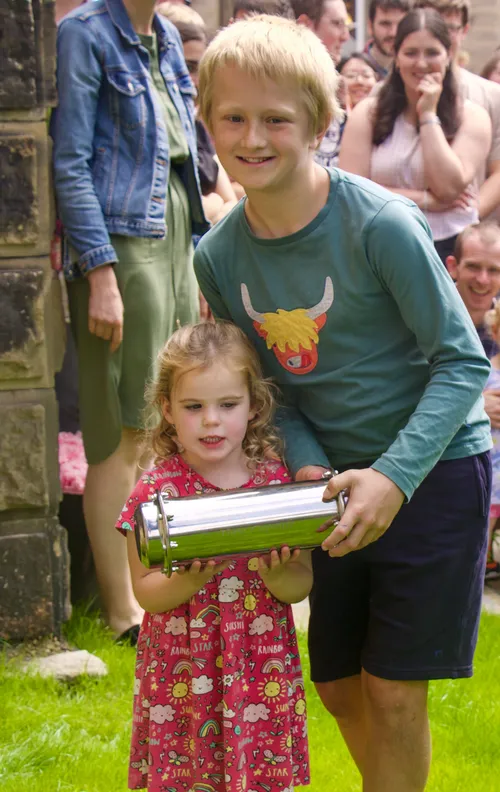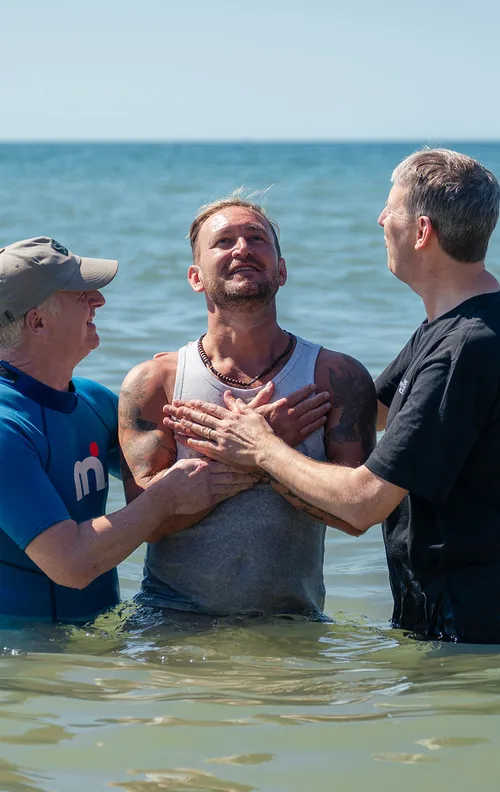A Harvest of Hope?
Environmental issues are receiving a great deal of media coverage at the moment. An FIEC church in Bath used its harvest Sunday activities to help it consider the extent to which Christians ought to be caring for our planet.
The two friends were enthusing about oranges at the front of the church.
‘They’re so bright, so shiny, so juicy, and so delicious!’ said Tom Skinner, who couldn’t wait to try one. He took the knife and chopping board that fellow church member Elizabeth Eyers had taken from her bag, and eagerly sliced through one of the oranges.
To the shock of everyone in the congregation, instead of the mouth-watering juicy interior we were expecting to see, black ash poured from the centre. Something that had been created to be good had become polluted and harmful.
This was the dramatic opening to Widcombe Baptist Church’s non-traditional harvest Sunday, titled A Harvest of Hope for God’s World?, led by Peter Harris and Dave Bookless1 of the Christian conservation charity A Rocha.
The theme of creation care was picked up in Sunday school where the children created bug hotels to help them appreciate the fantastic array of creatures God has made.
At lunchtime, around 150 people enjoyed a seasonal feast of vegetarian dishes and luscious puddings. For some, this was their first experience of vegetarian food and they were pleasantly surprised that cutting down their meat consumption to reduce their environmental impact need not be as much of a sacrifice as they imagined.
The afternoon offered the possibility of a walk by the Kennet and Avon canal using an app2 to encourage participants to pay close attention to their surroundings and to record and share their observations.
Of course, climate change, pollution and biodiversity loss are receiving a great deal of media coverage at the moment. But are they any concern of the church? Is caring for creation not a dangerous distraction from our true responsibility to proclaim Christ? Surely at best this is a minority interest?
In two sermons and a workshop during our harvest Sunday, Peter and Dave set out the biblical basis for creation-care as part of discipleship, illustrating their talks with examples from projects in which A Rocha is involved.
The Lord’s Earth
Peter and Dave began by emphasising that the earth is the Lord’s:
- God – Father, Son and Holy Spirit – created a perfect world. ‘In the beginning God created the heavens and the earth’ (Genesis 1: 1–2; John 1:3), and God was pleased with his handiwork, pronouncing it ‘very good’ (Genesis 1:26).
- God’s world is perfectly designed to provide for all his creatures (Psalm 104: 10–31).
- Creation reveals the glory of God, but is distinct from God and not to be worshipped in its own right. ‘The heavens declare the glory of God; the skies proclaim the work of his hands’ (Psalm 19:1; Romans 1:20; Job 38 and 39).
- The earth belongs to God. ‘The earth is the Lord’s and everything in it’ (Psalm 24:1), so resources do not belong to countries or to multinational companies, to be used for their benefit.
- God has promised, ultimately, to restore the earth (Hosea 2:18–22).
Our Relationship to Creation
Our speakers used Scripture to explain how we relate to creation:
- We are part of creation, made to reflect his character and to care for his world (Genesis 1:26; Genesis 2:15).
- The Fall impacted the natural world: ‘Cursed is the ground because of you’ (Genesis 3:17); ‘creation was subjected to frustration’ (Romans 8:19).
- Human sin resulted in God’s judgement on creation in the form of the flood (Genesis 6:7). God’s subsequent covenant never again to destroy the earth by flood was with Noah, his descendants, and ‘every living creature on earth’ (Genesis 9: 8–11).
- A broken relationship with God has disastrous social and environmental consequences: ‘…the land mourns, and all who live in it waste away; the beasts of the field and the birds of the air and the fish of the sea are dying’ (Hosea 4:1–3; Jeremiah 12:4).
- God will judge those who abuse his creation (Revelation 11: 18).
- God’s plan of redemption is cosmic in scale. Ultimately, creation will be ‘liberated from its bondage to decay and brought into the glorious freedom of the children of God.’ In the meantime, ‘the whole creation has been groaning in the pains of childbirth’ (Romans 8:21–22).
Jesus and Creation
Peter and Dave showed us that it was crucial to have Jesus at the centre of our understanding of creation in order to avoid the twin dangers of either worshipping it or abusing it. They explained that:
- Jesus is the source of creation. The natural world was personally made by Jesus, and bears his fingerprints; everything was made for him (Colossians 1:16).
- Jesus is the sustainer of creation (Colossians 1: 17).
- Jesus will ultimately be the Saviour of creation: ‘God was pleased… through him to reconcile to himself all things, whether things on earth or things in heaven, by making peace through his blood, shed on the cross’ (Colossians 1:20).
How should we respond?
Dave emphasised that, as Christians, our task is to follow Jesus and to seek his kingdom. If creation-care stems from any other motive, it is likely to become legalistic rather than a joyful response.
But what does it mean to say ‘Jesus is Lord’ when we are living in a materialistic society that is destroying creation? How should we respond? Dave suggested that we should listen to creation’s groaning, to pray, repent and intercede for our world.
Our lifestyle, he said, should in itself be an act of worship. We should seek to live more simply and to know and bless the places in which we live. Sustainability is key.
Peter and Dave shared that, in their experience, secular environmentalists could not agree on why the world mattered. Is it because of the benefit that humans derive from it? Does it have intrinsic value? Many are in despair over the future of the planet. They believe that human selfishness is the root of the problem, but can’t see a solution.
Christians know that the world matters because it is God’s handiwork. We have hope because God can change sinful human hearts and offer forgiveness and new life. And we know that, ultimately, he will redeem and renew his creation.
Footnotes
1. Dave Bookless has written a book on the subject for those interested in finding out more. It’s called Planetwise: Dare to Care for God’s World, and is published by IVP.
2. The iNaturalist app which helps you to identify the plants and animals around you.
All photos except the header image by Richard Ford.









